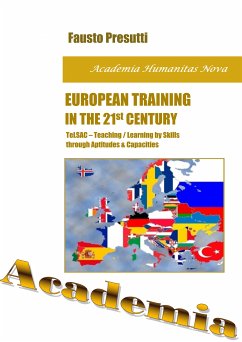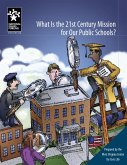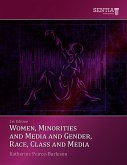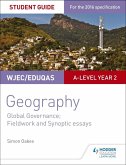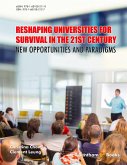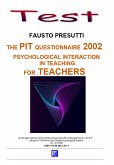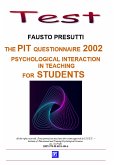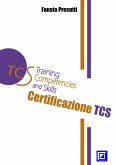Since the 2000s, the management of Universities and School and Training Institutions in Europe has undergone significant changes and radical modifications in the vision of educational Policies and Governance for the following reasons:
- the upgrading of facilities, study subjects and educational activities to the needs of students and the demands of the Techno-Informed Society of the 21st century;
- the effective and meaningful realization of Teaching/Learning by Skills through Aptitudes & Capacities (TeLSAC) by teachers (Presutti, 2018) as opposed to lessons based on Teaching for Transmission of Knowledge (TeTraK) that prevailed in the education of the Industrial Society of the 20th century.
In the early creation of the European Culture of the 21st century Society, defined by the European Union in the 90s, the model of Teaching/Learning by Skills through Aptitudes & Capacities (TeLSAC) has been considered the fundamental and indispensable basis to realize, promote and strengthen the aptitudes and competencies of the new generations:
- within the perspective of European citizenship, cooperation in training and social change in favor of growth, competitiveness and employment in the globalized world of work of the 21st century (European Commission, 1993, 1995; Delors, 1996);
- within teaching processes, involving the cognitive, psychic, social and professional spheres of each individual through the acquisition and use of four areas of knowledge: knowing how to know, knowing how to do, knowing how to live together, knowing how to be (Delors, 1996, pp. 91-103);
- through subject and cross-curricular, formal, informal, and nonformal learning (Cresson, 1996).
The Teaching/Learning by Skills through Aptitudes & Capacities Model has been considered fundamental by the European Commission for the construction of European Culture in the 21st century, both with regard to socio-educational-cultural dynamics and to the labour market.
The purpose of this book is to highlight how important it is that the Governance and Educational Policies of the countries that make up the European Union are aware of and agree on the fact that only by pursuing this innovative model of teaching / learning can achieve European Culture and that only in this way can the new generations be trained to face and manage the challenges posed by the Techno-Informed Society of the 21st century.
In the perspective of building the European Culture of the 21st century and based on the guidelines of the European Union developed in the 1990s, the I.S.P.E.F. Institute and the E.C.E. Network have developed and implemented the following Models of Teaching/Learning by Skills through Aptitudes and Capacities (Presutti 2017a, b):
* the DI.SCOL.A. Model for School Teacher Education;
* the "EMeS - Educational Methodological Strategies" Training Course Model for teaching guidelines in the School and University;
* the "TCS - Training Competencies and Skills" Certification Model (http://ispef.it/TCS) for the accreditation of Teaching Professionalism;
* the “ISPEF Model of University Master & High Quality Training” for university training (http://universita.ispef.it/accreditamento-uni.htm; http://universita.ispef.it/ispefmaster.htm);
* the “University Master & High Quality Training” Model for the accreditation of Higher Education Professional Courses and University Masters;
* the “PERFORMER” Model for TeLSAC training with University Teachers;
* the “SCA – Student Certification Assessment” Certification Model to warrant the students’ acquired competencies during school and university (http://www.ispef.it/SCA/; http://universita.ispef.it/cert-sca.htm).
- the upgrading of facilities, study subjects and educational activities to the needs of students and the demands of the Techno-Informed Society of the 21st century;
- the effective and meaningful realization of Teaching/Learning by Skills through Aptitudes & Capacities (TeLSAC) by teachers (Presutti, 2018) as opposed to lessons based on Teaching for Transmission of Knowledge (TeTraK) that prevailed in the education of the Industrial Society of the 20th century.
In the early creation of the European Culture of the 21st century Society, defined by the European Union in the 90s, the model of Teaching/Learning by Skills through Aptitudes & Capacities (TeLSAC) has been considered the fundamental and indispensable basis to realize, promote and strengthen the aptitudes and competencies of the new generations:
- within the perspective of European citizenship, cooperation in training and social change in favor of growth, competitiveness and employment in the globalized world of work of the 21st century (European Commission, 1993, 1995; Delors, 1996);
- within teaching processes, involving the cognitive, psychic, social and professional spheres of each individual through the acquisition and use of four areas of knowledge: knowing how to know, knowing how to do, knowing how to live together, knowing how to be (Delors, 1996, pp. 91-103);
- through subject and cross-curricular, formal, informal, and nonformal learning (Cresson, 1996).
The Teaching/Learning by Skills through Aptitudes & Capacities Model has been considered fundamental by the European Commission for the construction of European Culture in the 21st century, both with regard to socio-educational-cultural dynamics and to the labour market.
The purpose of this book is to highlight how important it is that the Governance and Educational Policies of the countries that make up the European Union are aware of and agree on the fact that only by pursuing this innovative model of teaching / learning can achieve European Culture and that only in this way can the new generations be trained to face and manage the challenges posed by the Techno-Informed Society of the 21st century.
In the perspective of building the European Culture of the 21st century and based on the guidelines of the European Union developed in the 1990s, the I.S.P.E.F. Institute and the E.C.E. Network have developed and implemented the following Models of Teaching/Learning by Skills through Aptitudes and Capacities (Presutti 2017a, b):
* the DI.SCOL.A. Model for School Teacher Education;
* the "EMeS - Educational Methodological Strategies" Training Course Model for teaching guidelines in the School and University;
* the "TCS - Training Competencies and Skills" Certification Model (http://ispef.it/TCS) for the accreditation of Teaching Professionalism;
* the “ISPEF Model of University Master & High Quality Training” for university training (http://universita.ispef.it/accreditamento-uni.htm; http://universita.ispef.it/ispefmaster.htm);
* the “University Master & High Quality Training” Model for the accreditation of Higher Education Professional Courses and University Masters;
* the “PERFORMER” Model for TeLSAC training with University Teachers;
* the “SCA – Student Certification Assessment” Certification Model to warrant the students’ acquired competencies during school and university (http://www.ispef.it/SCA/; http://universita.ispef.it/cert-sca.htm).

